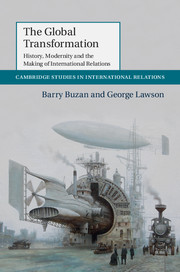Book contents
- Frontmatter
- Dedication
- Contents
- List of Figures
- List of Tables
- Preface
- List of Abbreviations
- Introduction
- Part I The Global Transformation and IR
- Part II The Making of Modern International Relations
- 3 Shrinking the Planet
- 4 Ideologies of Progress
- 5 The Transformation of Political Units
- 6 Establishing a Core–Periphery International Order
- 7 Eroding the Core–Periphery International Order
- 8 The Transformation of Great Powers, Great Power Relations and War
- Part III Implications
- Bibliography
- Index
5 - The Transformation of Political Units
Published online by Cambridge University Press: 05 February 2015
- Frontmatter
- Dedication
- Contents
- List of Figures
- List of Tables
- Preface
- List of Abbreviations
- Introduction
- Part I The Global Transformation and IR
- Part II The Making of Modern International Relations
- 3 Shrinking the Planet
- 4 Ideologies of Progress
- 5 The Transformation of Political Units
- 6 Establishing a Core–Periphery International Order
- 7 Eroding the Core–Periphery International Order
- 8 The Transformation of Great Powers, Great Power Relations and War
- Part III Implications
- Bibliography
- Index
Summary
Introduction
This chapter, along with Chapters 6 and 7, represents a division of labour in terms of how to discuss the emergence and expansion of the global transformation. In this chapter we focus on the transformation of political units. In the next chapter we focus on the ways in which rational states, industrialization and ideologies of progress bifurcated international order into a core–periphery structure that was global in nature and centred in the West. Chapter 7 charts the partial erosion of this core–periphery structure, concentrating mainly on developments since the Second World War. Together, these three chapters track the transformation of political, legal, economic, military and cultural relations from the nineteenth century to the present day. As all three chapters make clear, the processes of transformation in what became the core, and the restructuring of international order into a core–periphery form, were deeply intertwined. What happened in the emergent core both drew from and impacted on the emergent periphery, and what happened in the periphery both fed into and was shaped by what happened in the core. It is the two together that constitute the global transformation.
In earlier chapters, we noted the ways in which, during the nineteenth century, polities in the core were transformed by a shift in their ‘moral purpose’ from absolutism to popular sovereignty. The ideologies of progress redefined the identities of both states and peoples, thereby altering the foundations of political legitimacy. Nationalism sacralized borders and represented those outside these borders as alien, while liberalism, racism and, on occasion, socialism legitimized expansion into these alien spaces. The result was the rearticulation of imperialism as a progressive practice.
- Type
- Chapter
- Information
- The Global TransformationHistory, Modernity and the Making of International Relations, pp. 127 - 170Publisher: Cambridge University PressPrint publication year: 2015

